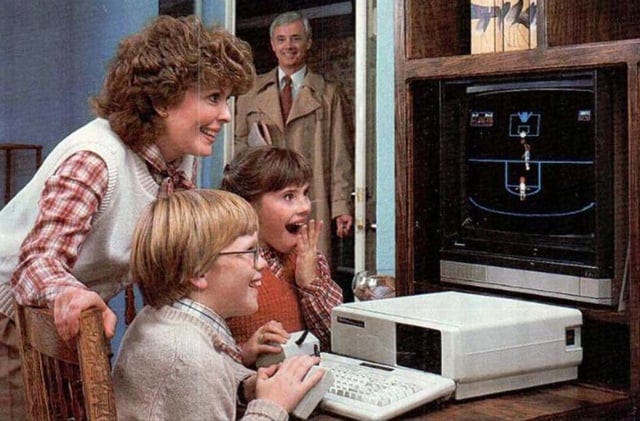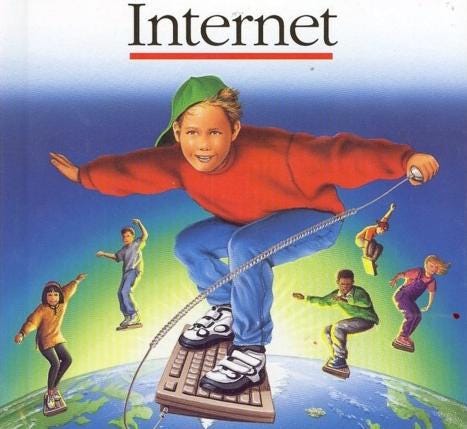The story of the Howard Government’s internet complaint hotline
How they tried to protect millennials from the internet
It’s hard to believe, but there was a time in Australia where, if you saw something that you didn’t like on the internet, you could pick up the phone, ring a Government organisation, complain, and they would try to take it down.
The year was 1999, the internet was new, and the Howard Government wasn’t very keen on all those dirty websites that were popping up. Their vision for the internet (if they had one at all) was something closer in tone to daytime television.
But how to make the entire internet a bit less like the back room of a video store, and a bit more like reruns of Dad’s Army? The Information Technology Minister at the time, Richard Alston, had a plan. Borrowing heavily from television broadcast classifications, Alston crafted legislation which targeted online content rated R or above. It made bureaucrats from the now-defunct Australian Broadcasting Authority the prefects of the internet. They had the power to issue take-down notices for websites and content they deemed to be offensive that were hosted in this country.
It was an anachronistic law that arrived just in time for the new millennium – the legislation came into effect January 1, 2000.
One article, written in March of that year, said that in three months of operating, the ABA had just 90 complaints on their hotline. They led to a total of 27 take-down notices. What a simpler time – these days I’ll see 100 things to complain about on the internet before it’s midday.
All kinds of locally-made smut was affected by the new legislation. Websites hosting pornographic photos, videos and brothel reviews were targeted. It was a devastating time for these small, online businesses. Some of them were down for a whole hour before they simply moved their website hosting offshore.
"The legislation is a little embarrassing - it shows how out of touch with the issue [the Government] are," one academic said at the time.
But Alston was happy with how things were running. "As far as I am concerned, the system is working pretty well,” he said. Here was a man promising to catch a tsunami with a sieve, unaware, or unwilling to admit, the futility of this endeavour. Either way, he and the Government were adamant they were doing the right thing in order to protect Australian children
Well, I was one of those children. Did Alston do it? Did he protect me and my peers from smut on the internet?
Unequivocally, he did not.
We millennial children stumbled around the internet, saw some stuff we shouldn’t, and largely survived it. Would we all have been smarter, happier, more empathetic without its intrusion on our collective childhoods? It’s impossible to say. “We shape our tools, and then our tools shape us", Marshall McLuhan’s maxim states. I am no more able to suppose whether I’d have been better off growing up before the printing press, the radio, television.
But if millennials do have some kind of psychological burden from poking around in the dark nooks and crannies of the internet as children, it is carried equally by all of us. A shared experience which informs how we navigate society, both online and in person.
Is this such a bad thing? We don’t arrive at adulthood suddenly one day, as though it were a train station. It’s incrementally gained through years and experiences. To hermetically seal children from the dangers of the world they will inhabit does them no favours.
In any case, Australians learnt that porn on the internet, and people’s insatiable appetite for it, was more powerful than any mere Government. That battle, at least, was abandoned. But each generation gets to be the centre of its own moral panic, and now the eye of Sauron has turned to the amorphously defined ‘social media’.
So here we are once again enacting legislation that we know will be ineffectual, because seemingly we have no collective memory. "We don't argue that its implementation will be perfect, just like the alcohol ban for under 18s doesn't mean that someone under 18 never has access, but we know that it's the right thing to do." Albanese said on the matter.
So we’re all happy, it seems, that these laws are symbolic rather than effectual? Even if they’re expensive and onerous to enact? That was the case in 2000 and, even with half a century of hindsight and the maturation of the first internet generation, that seems to be the case now.
It’s almost comforting to know that, while technology continues to move at an impossibly fast rate, the Government’s responses to it, at least, will be constant in its short-sightedness.
The more things change, the more they stay the same.
Can’t wait for next Monday? Want to read more now? Click here to find all my previous articles




I feel like we never truly recovered from salad fingers, Charlie the unicorn or the potter puppet pals.
Ah, simpler times.
They’ll take my eBaum’s World from my cold, dead, salad fingers.